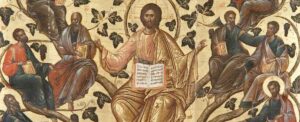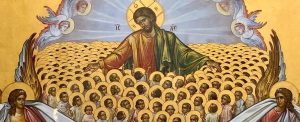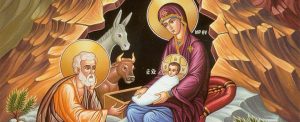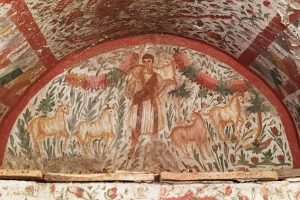Romans 12:6-14 • Matthew 9:1-8
Glory to God the Father, the Son, and the Holy Spirit. Amen.
Some years ago, a family started attending my church. They’d been kicked out of their former church for not tithing enough. Their former religion had also taught them that Jesus Christ is not God, not the way the Father is. I tried to explain how classic Christians worship Jesus Christ as the Creator of the world incarnate – but I didn’t seem to be getting through.
Then one Sunday today’s Gospel reading came up. Christ says to the paralyzed man, “Son, your sins are forgiven you.” And the people are scandalized: Why is this man blaspheming? Only God can forgive sins!
So the Lord agrees: You’re right! Anybody could say that your sins are forgiven, but would their saying so do anything? “Which is easier? To say your sins are forgiven, or to say, get up and walk?” So he turns to the paralyzed man and says, “Get up and walk.” And he does.
Now who has authority to speak for God?
When we got to that part of the Gospel reading, I could see the lightbulb come on for this family: Christ can raise up the paralytic, heal the sick, and forgive sins by his own authority because he is eternal God, coequal with the Father and the Holy Spirit. They asked to join the Orthodox Church and in time we baptized them.
* * *
Here’s something I never really noticed until I started reading classic Christian teaching from more than a few years ago:
After the Resurrection, in John chapter 20, the Lord appears to the apostles in the upper room.
Jesus said to them, “Peace be to you! As the Father has sent Me, I also send you.” And when He had said this, He breathed on them, and said to them, “Receive the Holy Spirit” (John 20:21-23).
This isn’t Pentecost. It’s not the coming of the Holy Spirit to dwell in every Christian through baptism in water and the Spirit. This is not the universal priesthood of all believers, though that is definitely a thing in scripture.
This is fifty days before Pentecost, on the evening of the resurrection. And to the apostles – and not to the hundreds or thousands of other believers in Christ – the Lord says:
“As the Father has sent Me, I also send you.” And when He had said this, He breathed on them, and said to them, “Receive the Holy Spirit. If you forgive the sins of any, they are forgiven them; if you retain the sins of any, they are retained.”
This is the same thing he’d said earlier to Peter.
Simon Peter said, “You are the Christ, the Son of the living God.” And Jesus answered him, “I say to you that you are Peter, and on this rock,” – on the foundation of your confession of faith – “I will build My church, and the gates of Hades will not prevail against it. I will give you the keys of the kingdom of heaven, and whatever you bind on earth will be bound in heaven, and whatever you loose on earth will be loosed in heaven” (Matthew 16:13-19).
The pastoral authority of the apostles, and their successors, the bishops, comes from this: Christ has explicitly delegated to them the care of the Church, including declaring the forgiveness of sins. Not only Saint Peter, founder of the Church of Antioch, not only to James, the first bishop of Jerusalem, but every bishop in the Church has the God-given authority to bind and loose. In our generation there are people who say Peter was an Über-Bishop, because he had the authority to bind and loose. But there aren’t any bishops who are less than Peter in authority; either you have the keys of the kingdom, or you’re not a bishop. (Cf. On the Unity of the Church, by St Cyprian of Carthage, c.250 AD)
The Church grew so big, so quickly, in the first century, that the bishops began delegating some of their tasks to the other elders in the local parishes and missions – tasks like baptizing, celebrating the Eucharist, anointing people to receive the Holy Spirit, and declaring the forgiveness of sins. Elders are presbyters in Greek. We shorten that up and say priests. So Saint James writes,
Is anyone among you sick? Let him call for the presbyters of the church, and let them pray over him, anointing him with oil in the name of the Lord. And the prayer of faith will save the sick, and the Lord will raise him up. And if he has committed sins, he will be forgiven. Confess your trespasses to one another, and pray for one another, that you may be healed. (James 5:14-16).
The early Christians found that this was not only part of baptism and rising to newness of life. Experience says Christians need to hear, more than just once, we need to hear the words spoken with authority, that God has forgiven us every sin from which we repent. The practice of frequent, personal, private confession and repentance, with an elder appointed by the bishop to speak absolution, became normal in Christian practice in east and west and throughout the Church.
* * *
In today’s Gospel, four men bring their paralyzed friend to see Jesus. When Saints Mark and Luke tell this same event (Mark 2:1-12; Luke 5:17-26) they add that the house is too full to even get close – so these four men get a ladder, climb up on the roof, pull up tiles, and lower their friend through the ceiling to where Jesus is. Saint Mark writes, “When Jesus saw their faith, He said to the paralytic, ‘Son, your sins are forgiven you.’”
Did you catch that? The Lord often tells people, “Your faith has made you whole.” But here we don’t hear anything about the paralyzed man’s faith. “When Jesus saw their faith” – the faith of the four friends who carried him up to the Lord – then he spoke forgiveness and healing to him.
There are times when you and I have looked up from our daily stress and trouble, and with peace and confidence said we know the Lord will change it. He can bring beauty out of ashes and he will make our lives right in his time. And that faith and hope makes us feel the nearness of God in the midst of our pain.
And other times the tank is empty. Our heart has run dry, our fire’s gone cold, and we don’t have a lot of faith to offer the Lord.
And we come into the temple, and what’s the first thing we see? “We are surrounded by a great cloud of witnesses” (Hebrews 12:1). Thousands of martyrs, and tens of thousands of saints on these icons and in the heavens are standing with us, bringing our name to the Lord in intercession. The saints – and the brothers and sisters here in our parish community – are praying with you. You don’t have to be the strong one every time.
Blessed are the poor in spirit (Matthew 5:3) – the ones who have nothing to bring to God.
The saints, the Mother of God, the brothers and sisters standing with you: They are providing the faith today. And, seeing their faith, the Lord says to you “Your sins are forgiven.”
“Come to Me, all you who labor and are heavy laden, and I will give you rest. Take My yoke upon you and learn from Me, for I am gentle and humble in heart, and you will find rest for your souls. For My yoke is easy and My burden is light” (Matthew 11:28-30).
To the glory of God the Father, the Son, and the Holy Spirit. Amen.






